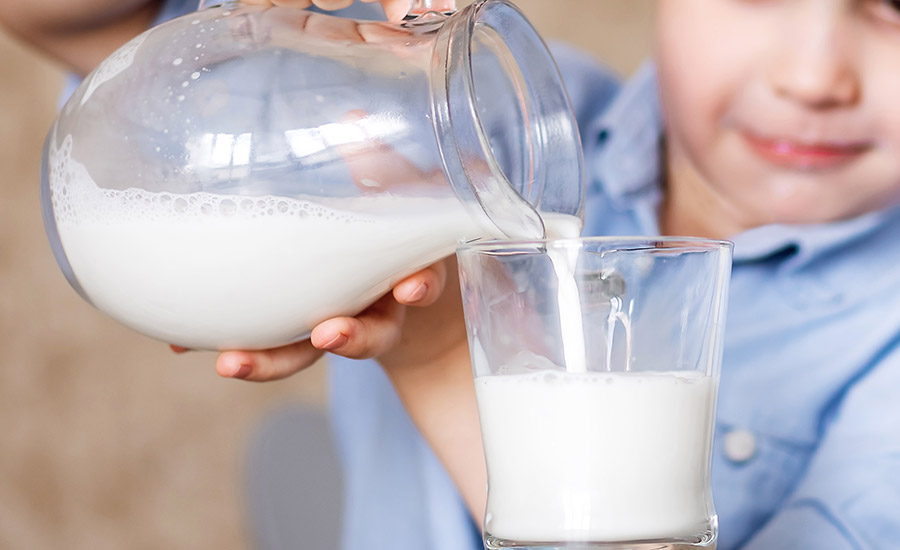Lawmakers and health experts unite to push back against outdated school milk policies.
A renewed effort is underway in Washington to bring back fuller milk options—including whole and 2% milk to school cafeterias across America. The push centers around the Whole Milk for Healthy Kids Act of 2025, a bill that could reshape how students get their daily dose of dairy.
Currently, the U.S. Department of Agriculture (USDA) mandates that schools serve only fat-free or low-fat milk, either flavored or unflavored. But supporters of the new bill argue that these limitations no longer align with modern nutritional science.
“The bill modifies these restrictions and instead permits schools to offer students whole, reduced-fat, low-fat and fat-free flavored and unflavored milk,” according to the legislation’s summary.
Outdated Science, Outdated Policy?

Whole and 2% milk have been banned from school meals since 2012. The restriction was originally based on concerns about saturated fats and calorie counts, which experts believed contributed to childhood obesity and heart disease risks.
But now, some of the nation’s leading nutrition experts argue that science has moved on.
Matt Herrick, executive vice president and chief impact officer at the International Dairy Foods Association (IDFA), told “Milk is one of the most nutritious, complete whole foods available.”
He went on to emphasize milk’s dense nutritional profile “Milk is more than 90% water, plus a minimal amount of healthy fat, and the rest are essential nutrients: protein, calcium, phosphorus, vitamin A, vitamin D, riboflavin (B2), niacin (B3), pantothenic acid (B5) and cobalamin (B12), iodine, potassium, selenium and zinc. That’s it.”
That nutritional value is exactly why 83% of American grocery shoppers choose whole and 2% milk.
Herrick added. “When Americans shop at the grocery store, 83% of shoppers purchase whole and 2% milk for their families, meaning this is what children are getting at home.”
A Science-Backed Return

The USDA currently recommends that children aged 2 and up consume dairy milk daily. Pediatric nutritionist Keith T. Ayoob, Ed.D., who testified before the Senate Agriculture Committee, argued that current school milk rules don’t reflect updated nutritional knowledge.
“The body of credible nutrition science has evolved,” Ayoob explained, referring to the decision to eliminate whole and reduced-fat milk to reduce heart disease risks by limiting saturated fat to below 10% of school meals.
Citing newer research, Ayoob stated, “A systematic review of studies that looked at cardiometabolic health in children ages 2 to 18 years found that consumption of dairy products, including whole and reduced-fat milk, had no association with cardiometabolic risk.”
He drove the point home with a reminder that nutrition guidelines must adapt with science, “Nutrition is not a static science. It is dynamic. It should be. We should constantly be learning, revising and fine-tuning our recommendations as credible science keeps evolving.”
Debunking the Fat Myth
One of the most persistent beliefs surrounding milk is its link to childhood obesity. Ayoob tackled that head-on “There’s no correlation between milk and obesity.” In fact, he said, “The correlation is inverse.”
This claim challenges more than a decade of policy, prompting growing support for a policy overhaul.
Advocacy Groups Weigh In

Public health reform organizations are also backing the Whole Milk for Healthy Kids Act. A spokesperson for MAHA Action, a 501(c)(4) group based near Washington, D.C., spoke.
“We agree that whole milk is the healthiest option for kids,” the spokesperson said, echoing a growing chorus of support for revising federal milk guidelines in schools.
They added, “Current science shows that healthy fats are critical to a balanced diet – and one of the best forms of healthy fats is whole milk.”
As lawmakers debate the future of dairy in schools, one thing is clear: nutritional science has changed, and many believe school lunch policy must change with it.



